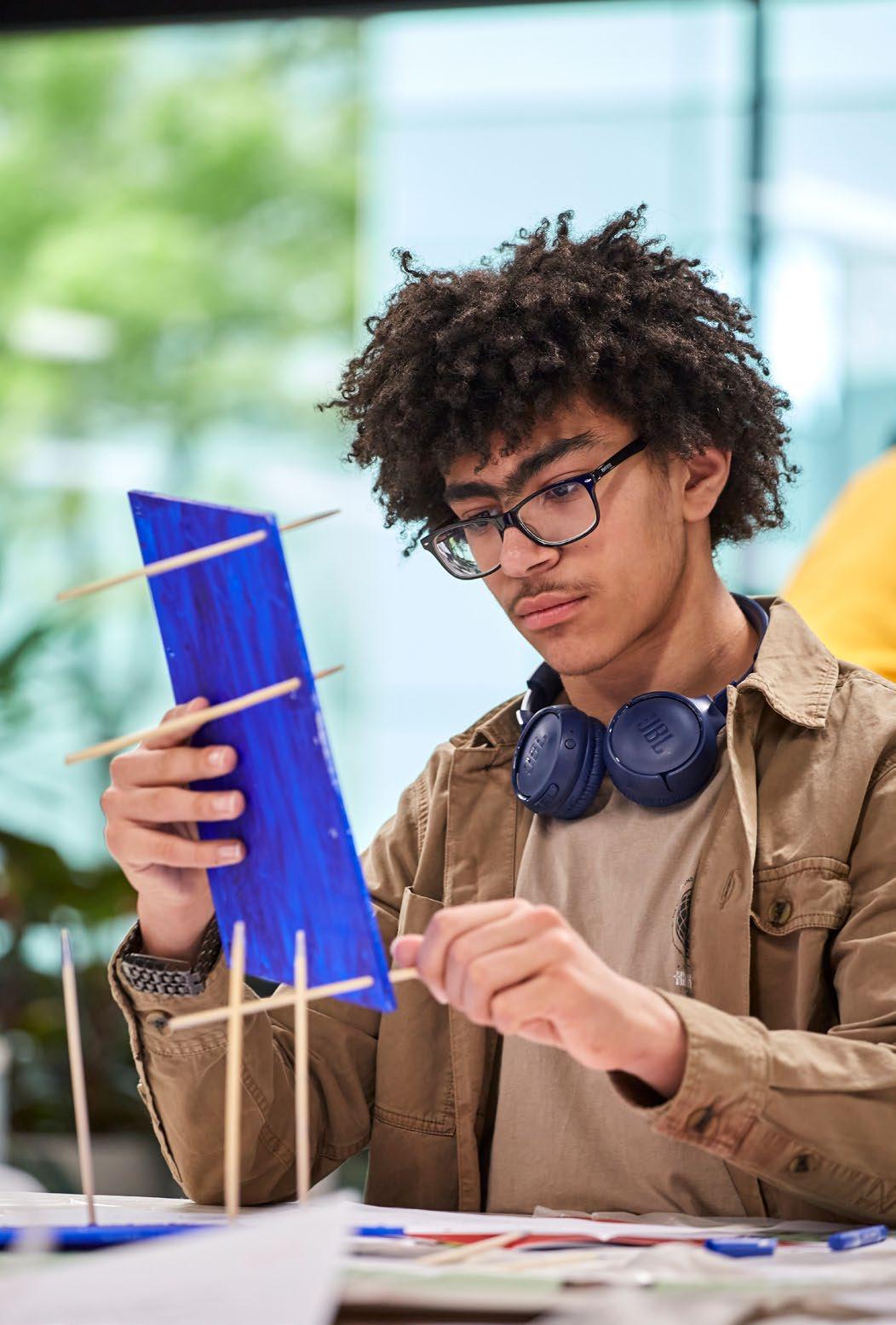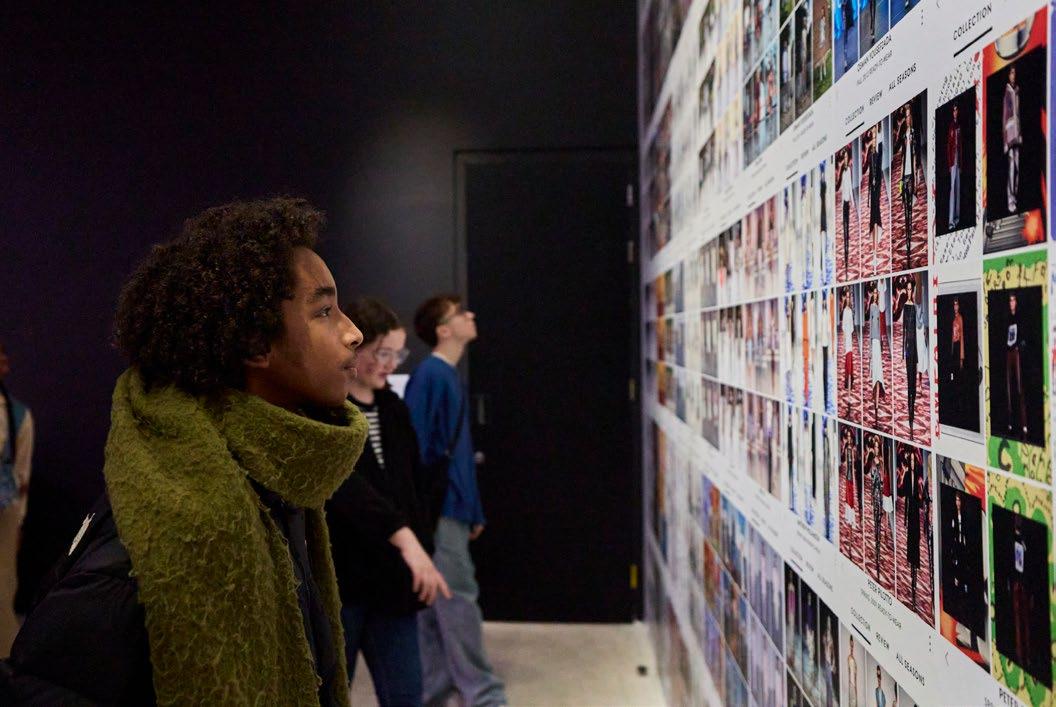Extracurricular education –a vital right
Extracurricular education is widely acknowledged as life-enhancing, yet many young people are unable to beneft from it. Through its free and diverse programmes, the National Saturday Club is addressing this lack of equity and increasing the opportunities for all young people to expand and enrich their learning journey
The National Saturday Club believes it is a fundamental right of young people to pursue extracurricular activities, and to beneft from the educative and social advantages that these can bring. However, socioeconomic and other factors frequently impede many young people’s access to these valuable non-formal learning opportunities, denying them experiences that could broaden their horizons and positively impact their skills development and wellbeing. Past evaluation by the National Saturday Club has shown that 55% of widening participation Club members were not taking part in any other regular out-of-school activities. This increased to over 60% for young people from low income families,1 in areas of deprivation2 and young people whose parents had not been to university.3
Contributors
Jane Fernandes
Collective Action and Advocacy Manager, Fair Education Alliance
Georgia de Buriatte
Saturday Club tutor and coordinator, Winchester School of Art, University of Southampton, and former member of the National Saturday Club Tutors’ Advisory Group
Matt Yeoman
Assistant Head Teacher, Queen’s Park High School, Chester
As documented in the Education Policy Unit’s 2024 report Access to extra-curricular provision and the association with outcomes, 4 cost is just one of the roadblocks that young people from lower socio-economic backgrounds can encounter on the path to extracurricular education. A lack of knowledge about the opportunities that exist; a sense of not belonging in certain environments; and insuffcient provision for those with a disability or special education needs can all hinder access. Research by the Social Mobility Commission has highlighted that gender, ethnicity and geographic location can also play a part in participation levels, as well as school attended, “with independent schools in particular likely to offer an unparalleled breadth and range of activities compared to state schools”.5 →
1. In 2023, 63% of Club members who were receiving schools meals were not taking part in other regular out of school activities; 81% were not taking part in other cultural or arts activities; 74% were not taking part in sports activities.
2. In 2023, 62% of Club members who were living in the 30% most deprived areas were not taking part in other out-of-school activities
3. In 2023, 66% of Club members whose parents had not studied at university were not taking part in other regular out-of-school activities
4. D. Robinson (2024), Access to extra-curricular provision and the association with outcomes, Education Policy Institute, p.5
5. M. Donnelly, P. Lažetić, A. Sandoval-Hernandez, K. Kumar and S. Whewall (2019), An Unequal Playing Field: Extra-Curricular Activities, Soft Skills and Social Mobility, Social Mobility Commission, p.6

“These activities reinforce curriculum-based learning and create space for children with diverse interests to grow through play and creativity”
Jane Fernandes, Collective Action and Advocacy Manager, Fair Education Alliance
The increasing volume of quantitative and qualitative research underlining the benefts of extracurricular education, and the wider implications of unequal access to this type of activity, speak to the intrinsic value of all young people engaging in varied types of learning, both formal and non-formal, and the issue of social mobility, if many are unable to take up educational pursuits beyond the classroom. Jane Fernandes, Collective Action and Advocacy Manager at the Fair Education Alliance, supports the view that levelling access to extracurricular education is pivotal:
“The evidence is clear that extracurricular activities can support academic outcomes, wellbeing and better engagement with school, helping to address the attendance crisis. These activities reinforce curriculumbased learning and create space for children with diverse interests to grow through play and creativity. During extracurricular activities, pupils also learn skills for the future that can’t be taught in a classroom. The socio-economic gap in the provision of extracurricular education is notable, with independent schools offering an exceptional range of activities compared to state schools. If this gap is not addressed, we will see the continuation of this societal divide as these pupils enter the workforce.”
The National Saturday Club’s evaluation confrms that after engaging in its programmes young people experience a wealth of benefcial impacts, including improved self-confdence and wellbeing, the development of core skills they can apply in diverse contexts, and a widening of their social networks. For example, in 2023–24, 78% of Club members relayed that they have grown in confdence; 70% found that joining a Club has improved their outlook on the future; 73% have got better at communicating their ideas; 70% value working with other people more; 81% are better informed about potential jobs and careers; and 89% of parents or guardians noticed that their child was more willing to try new things and “have a go”.
These outcomes have both immediate and far-reaching effects, and are also evidenced in additional comments that Club members and their parents or guardians make at the end of each year. One Club member noted:
“Having these types of opportunities helped me realise how fun Saturday Clubs can be and made me feel confdent to share my ideas and opinions. I believe this is a great age to experience a different curriculum [that may help you go] on to further education.”
Another commented:
“It feels nice to know you’ve done something outside of school. You get to express [your] feelings without being judged [and learn] skills that stretch off in different directions.”
For many parents or guardians, the impact of Saturday Club activity on their children is similarly positive. Two parents this year made the following comments:
“I imagine that it is a rare occurrence that one weekend course has the impact to change the trajectory of someone’s life. However, in my son’s case, I do think we have witnessed the very same.”
“It’s expanded [my daughter’s] mind meeting new people and trying out ‘college life’ in preparation for post-GCSEs. It’s improved her confdence and she enjoyed it so much she would actually be happy to look at different courses to take up in future.” →


